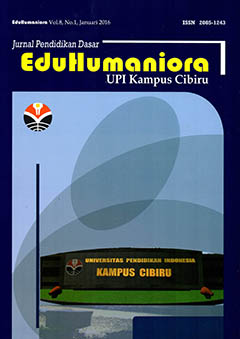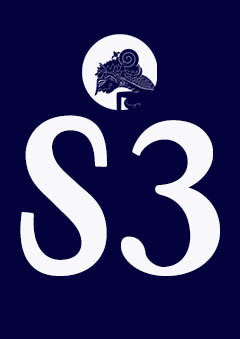CREATIVE THINKING AND COLLABORATIVE ABILITY OF ELEMENTARY STUDENTS WITH THE IMPLEMENTATION OF THE STEM INTEGRATED PROJECT-BASED LEARNING MODEL
Abstract
This paper is motivated by the author's efforts to improve the quality of Human Resources (HR) in accordance with the demands/developments of the times. This research was conducted to (1) find out how the differences in creative and collaborative thinking skills through STEM-integrated project-based learning and the use of conventional learning models, (2) describe creative and collaborative thinking skills using STEM-integrated project-based learning models. This study uses a quantitative approach method. It was held at Gugus 4 Cibadak, Public Elementary School Pamuruyan (as the control class) and Public Elementary School Cilengo (as the experimental class). Creative thinking data collection is using posttest and pretest, while for collaborative ability data collection is by observation sheets. The results showed that (1) the creative thinking ability (mean pretest 32,14 for experiment class and 40,17 for control class, mean posttest 79, 29 for experiment class and 40,83 for control class) and collaborative ability of the class with STEM-integrated project-based learning were superior/got more significant results than the class that used conventional learning models, (2) students' creative abilities emerged into several indicators such as fluency, flexibility, original thinking, and elaborative thinking, (3) collaborative abilities appear in the field based on indicators of confidence, positive attitude, respect, giving encouragement, and building group spirit.
Keywords
Full Text:
PDFReferences
Beuchat, P. N., Bradford, G. J., and Buskes, G. (2022). Challenges and opportunities of using differential-drive robots with project-based learning pedagogies. IFAC-PapersOnLine, 55(17), 186-193.
Covington, E. W., Kyle, J. A., Prince, V. T., Roberts, M. Z., and Worthington, M. A. (2021). Impact of a novel preceptor collaborative advanced pharmacy practice experience curriculum on student-perceived ability and confidence. Currents in Pharmacy Teaching and Learning, 13(8), 1053-1060.
Fathoni, A., Muslim, S., Ismayati, E., Rijanto, T., Munoto, and Nurlaela, L. (2020). STEM: Innovation in vocational learning. Jurnal Pendidikan Teknologi dan Kejuruan, 17(1), 33-42.
Gomez-del Rio, T. and Rodrigvez, J. (2022). Design and assessment of a project-based learning in a laboratory for integrating knowledge and improving engineering design skills. ELSEVIER: Education for Chemical Engineers, 40(2022), 17-28.
Goyal, M., Gupta, C., and Gupta, V. (2022). A meta-analysis approach to measure the impact of project-based learning outcome with program attainment on student learning using fuzzy inference systems. Heliyon, 8(8), 1-6.
Gube, M. and Lajoie, S. (2020). Adaptive expertise and creative thinking: A synthetic review and implications for practice. ELSEVIER: Thinking Skills and Creativity, 35(2020), 1-14.
Hambali, H., Fadhilah, N., Herdianty, R., and Hamid, S. M. (2020). Pengaruh model Project Based Learning (PJBL) sebagai implementasi kampus merdeka terhadap keterampilan kolaborasi mahasiswa prodi pendidikan biologi. Jurnal Ilmiah Ecosystem, 20(3), 272-279.
Indrawan, F. Y., Irawan, E., Sayekti, T., and Muna, I. A. (2021). Efektivitas metode pembelajaran jigsaw daring dalam meningkatkan keterampilan kolaborasi siswa SMP. Jurnal Tadris IPA Indonesia, 1(3), 259-268.
Jenni, L. (2020). Self-efficacy and performance feedback: Impacts on cognitive load during creative thinking. ELSEVIER: Learning and Instruction, 71(2021), 1-11.
Lin, G. Y. (2019). Scripts and mastery goal orientation in face-to face versus computer-mediated collaborative learning: Influence on performance, affective and motivational outcomes, and social ability. ELSEVIER: Computer and Education, 1-32.
McIntyre, M. M., Gundlach, J. L., and Graziano, W. G. (2021). Liking guides learning: The role of interest in memory for STEM topics. Learning and Individual Differences, 85, 1-8.
Mutambara, D. and Bayaga, A. (2020). Determinants of mobile learning acceptance for STEM education in rulal areas. ELSEVIER: Computers and Education, 1-30.
Nahar, T., Hanifah, A. N., Anam, K., and Hanik, E. U. (2022). Peningkatan kreativitas siswa dalam pembelajaran PPKn melalui metode Problem Based Learning (PBL). MASALIQ, 2(1), 144-158.
Natty, R. A. (2019). Peningkatan kreativitas dan hasil belajar siswa melalui model pembelajaran project based learning pada siswa sekolah dasar. Jurnal Basicedu: Research and Learning in Elementary Education, 3(4), 1087-1092.
Nurhadiyanti, A. (2021). Pengaruh model Project Based Learning (PJBL) terhadap hasil belajar siswa di sekolah dasar. JURNAL BASICEDU: Research and Learning in Elementary Education, 5(1), 327-333.
Wardani, R. P. (2021). Melatih keterampilan berpikir kritis dan berpikir kreatif siswa SD kelas V melalui pendekatan saintifik. ALPEN: Jurnal Pendidikan Dasar, 5(2), 87-96.
Weinberger, Y. and Shonfeld, M. (2018). Students willingness to practice collaborative learning. Teaching Education, 32(2), 127-143.
Yang, Q., Song, X., Dong, M., Li, J., and Proctor, R. W. (2021). The underlying neural mechanisms of interpersonal situations on collaborative ability: A hyperscanning study using functional near-infrared spectroscopy. Social Neuroscience, 16(5), 549-563.
Yang, Z., Zhou, Y., Chung, J. W., Tang, Q., Jiang, L., and Wong, T. K. (2018). Challenge based learning nurtures creative thinking: An evaluative study. Nurse Education Today, 71, 40-47.
Zucker, T. A., Montroy, J., Master, A., Assel, M., McCallum, C., and Yeomans-Maldonado, G. (2021). Expectancy-value theory and preschool parental involvement in informal STEM learning. Journal of Applied Developmental Psychology, 76, 1-13.
DOI: https://doi.org/10.17509/eh.v15i1.50630
Refbacks
- There are currently no refbacks.
Copyright (c) 2023 EduHumaniora | Jurnal Pendidikan Dasar Kampus Cibiru
EduHumaniora: Jurnal Pendidikan Dasar
Published in collaboration Program Studi PGSD UPI Kampus Cibiru
and
HDPGSDI
This work is licensed under a Creative Commons Attribution-ShareAlike 4.0 International License.















